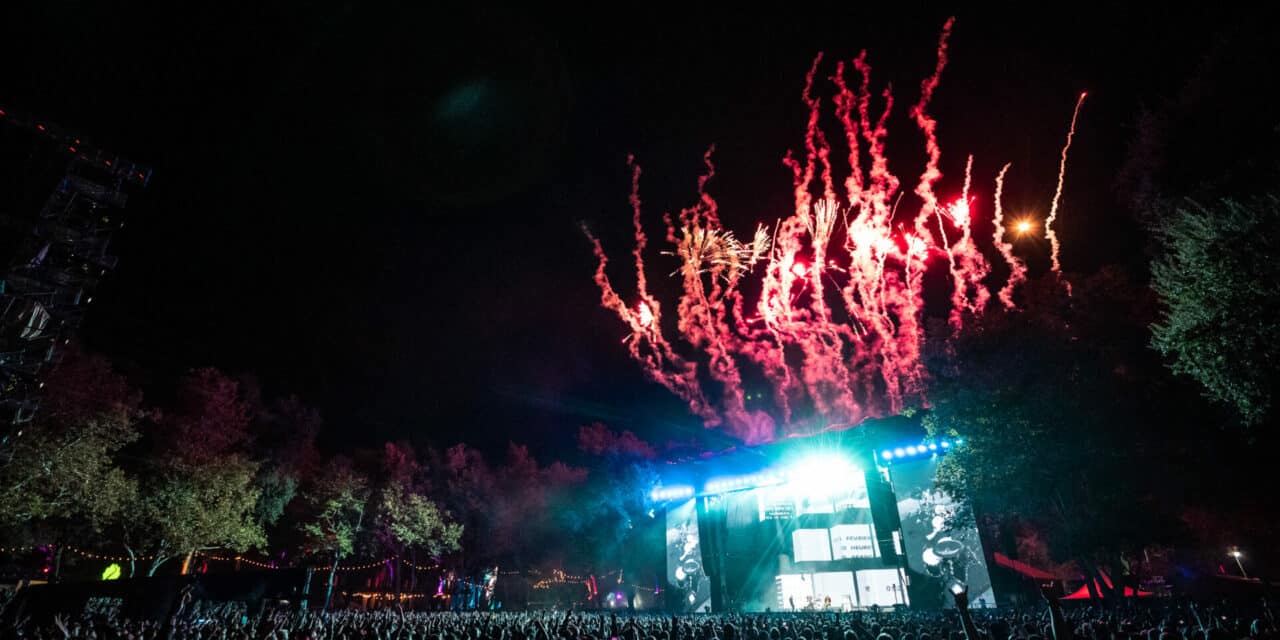Wherever I May Roam: Aftershock Festival during Metallica’s 2021 set. The festival has become a tourism magnet in Sacramento, with people flying in from as far as Sri Lanka. (Steve Thrasher)
Conditions have long been ripe for California’s capital city to grow beyond its reputation as a political base, agriculture hub and commuter town in the shadow of the Bay Area. But with mild winters, the relatively low cost of living and a healthy music and sports scene, it’s still taken a little while to get there — and it’s still a work in progress.

“It’s taken a long time, but I think the city’s on track,” says Eric Rushing, life-long Sacramento resident, club owner and local talent buyer. Rushing opened the 1,050-capacity Ace of Spades club downtown in 2011. “It’s still another 10 years out to be really blossoming, but we’re getting there. With all the amazing talent between the amphitheater and the arena and small rooms like Ace of Spades and Harlow’s and the Goldfields, there’s some great things going on in Sacramento and some great acts coming through the market.”
SEE: Sacramento Select Venues In Play (Click for PDF)
Rushing and his business partner Bret Bair sold Ace of Spades to Live Nation in 2016 and Rushing became a full-time talent buyer with the company. He books and advises programming in clubs and theaters in the region while independently owning and operating a handful of other venues in the area.
Entertainment veterans like Rushing have seen the city evolve alongside sports. While he can proudly claim to have seen bands like Nirvana, Pearl Jam and No Doubt play small, now-closed rooms like the Cattle Club in the 1990s, the city needed to grow to keep up with the changing live entertainment landscape.
That type of evolution takes major development and backing from civic leaders, the private sector and the local community. All participants in the market point to the opening of Golden 1 Center downtown in 2016 as the catalyst for growth.
“The fact that we just finished our fifth year anniversary is kind of crazy to us,” says John Rinehart, president of business operations for the Sacramento Kings, the arena’s NBA tenant. “It seems like we just opened yesterday. When we decided to put the arena downtown, (Kings owner Vivek Ranadivé)’s vision was ‘let’s build a world class entertainment center in the center of our downtown in the capital of California,’ the fifth-largest economy in the world, and make it a destination where people can enjoy everything that the great city of Sacramento has, starting with world-class arts and entertainment lifestyle district anchored by Golden 1 Center.”
The $550 million,17,500-capacity arena was built to anchor development in a city with not a whole lot going on downtown, tied to Ranadive’s commitment to sustainability and technology.
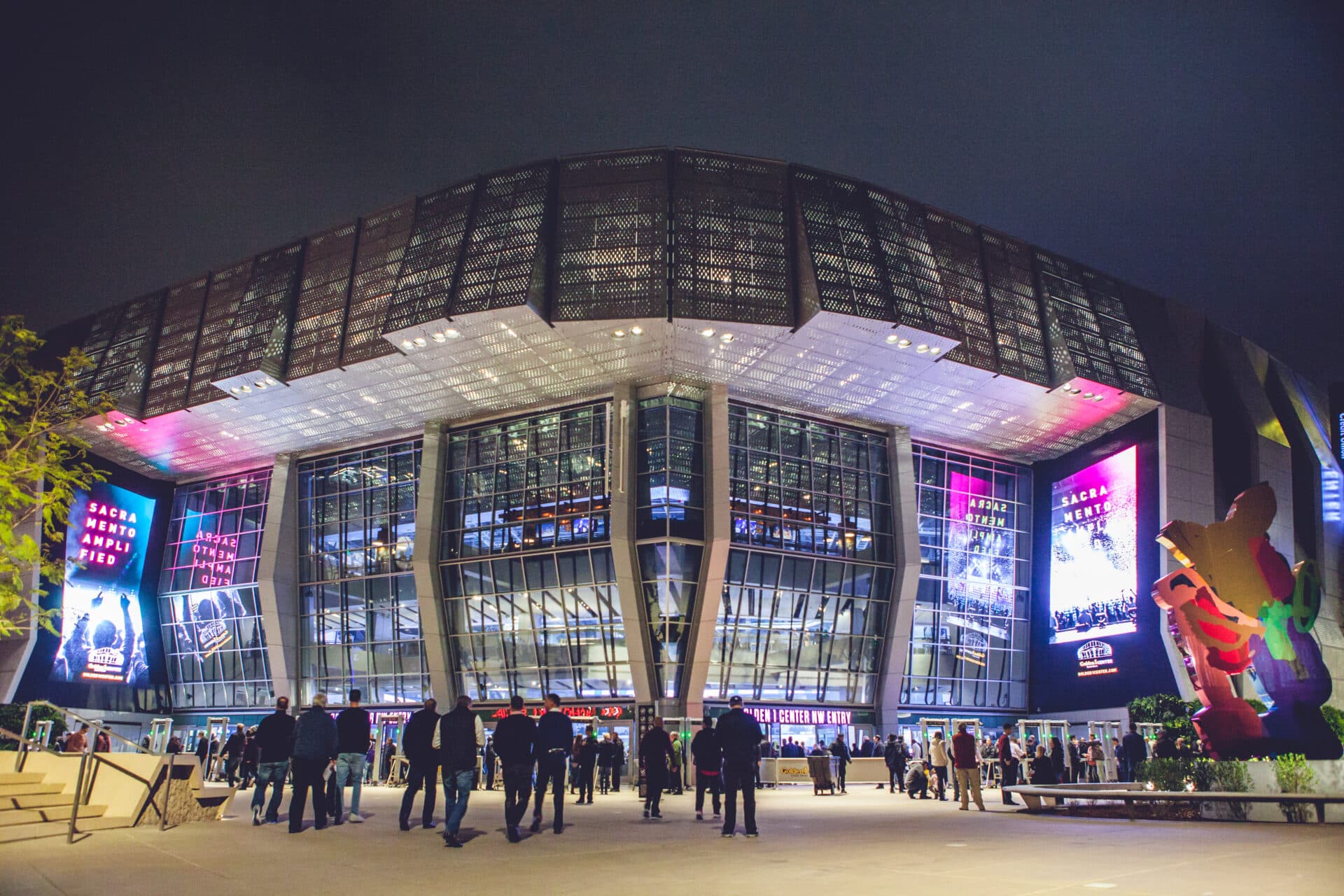
Sacramento Amplified: The 2016 opening of the Golden 1 Center has revitalized Sacramento’s downtown and gotten industrywide attention for its tech and sustainability efforts.
It’s gone on to be one of the busiest arenas in the world for touring artists, ranking No. 6 on Pollstar’s 2021 Year End Top Worldwide Arenas chart. It came in No. 35 on the 2022 Mid-Year Arenas chart, with 239,126 tickets reported sold.
Over the past five years, 41 downtown properties valued at $1.5 billion have been sold, with 25 developments currently under construction and 81 projects planned, according to data provided by the Kings. The arena sits in what is known as the Downtown Commons development, DoCo for short, which includes the $190 million, 250-room Kimpton Sawyer Hotel, developed by Ranadivé, that also includes team office spaces.
See Also: Hard Rock Live Sacramento Ups The Ante
The arena made substantial commitments in tech designed to “future-proof” the building, including in 2021 opening a Tesla Supercharger Station powered by solar energy produced at the arena. Commitments in sustainability include being the first NBA venue to receive LEED Platinum certification.
Kings officials say the success of the arena shows the big bets and capital investment can be an example to other cities across the word.
“The level of investment required and the commitment to build a project like this is incredibly hard today but the conversations are getting easier, as we’ve seen,” said Kings senior vice president and general manager Alex Rodrigo. “This arena has created a springboard for other facilities to open with that vision in mind, because this is a proven entity in itself. To take on that challenge, that risk to be innovative and forward-thinking, 10 years ago is something that gives us a tremendous amount of pride. As we’re building out the next five to 10 years and seeing where we stand in innovation, technology and community, we don’t take that lightly.”
Recent arena upgrades include the Row One Club premium space opened last year. Soon to be announced is another premium club space, named The Club presented by Red Hawk Casino.
Drawing From Afar
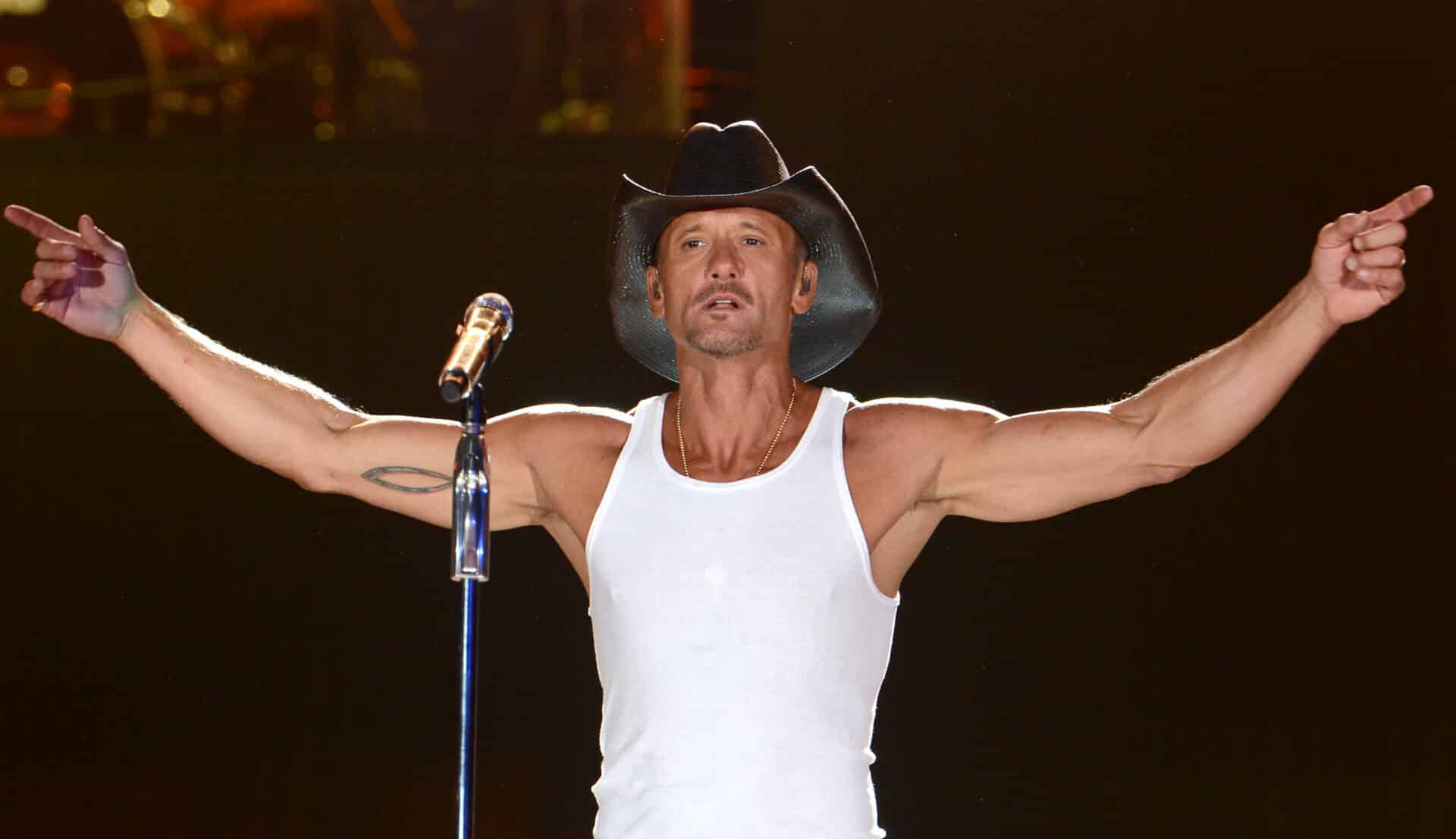
Golden Sky: Tim McGraw, shown at the Toyota Amphitheater in Wheatland, is headlining the new Golden Sky festival at Discovery Park in October. (Getty Images).
Officials with Danny Wimmer Presents saw Sacramento’s potential before the arena opened. The promoter’s Aftershock Festival has taken place in Sacramento since 2012 and grown to four days, attracting 40,000 daily attendees. The event, which features metal rock headliners such as Metallica, Judas Priest and Slipknot, has made a big impact on not just the city but the greater concert landscape, drawing rock and metal fans from around the world.
“When I look at all the events we host in Sacramento, whether it’s major conventions or sporting events or even the California State Fair, nothing produces hotel room nights like Aftershock,” said Mike Testa, president and CEO of Visit Sacramento. For 2019’s festival, 500 people came from Canada, plus visitors from London, Moscow and Sri Lanka to see their favorite bands. “The numbers we have show that Aftershock attendees are about 65% people that don’t live in the Sacramento region, which is exactly what I want as the guy in charge of tourism.”
DWP, headquartered in Los Angeles, is known for developing secondary markets into major destinations, promoting similar events in Columbus, Ohio, and Louisville, Kentucky, among others. When looking at the market as a potential festival home in 2012, Danny Wimmer Presents CEO Danny Hayes said the team “just fell in love” with Sacramento, where festival site Discovery Park offers a lush setting with plenty of space, along with more predictable and favorable weather conditions than many markets.
Hayes said there’s no space at the park to expand Aftershock itself, but there is room for other events.
For 2022 DWP has introduced a new country festival, Golden Sky on Oct. 15-16 at the same site, the following weekend after Aftershock and headlined by Sam Hunt and Tim McGraw. In 2019, the promoter first dipped its toes into country festivals with Hometown Rising festival in Louisville, where the event producer put on three consecutive festivals, dubbed “The Louisville Trifesta,” that drew a combined attendance of 290,000.
“If you curate the right artists, that gets you a lot of initial attention,” Hayes says of launching a new event. “Then you hope our DWP reputation gives people comfort to try a festival — this is a reputable company that does all these other festivals — they know they’ll have a good experience and are willing to take a shot on a first-year event.”
Hayes says the shared-site, consecutive-weekend festival model is one the company hopes to continue in multiple markets, but current economic conditions and travel expenses for fans mean now may not be the time for overly aggressive expansion.
“This double-whammy of COVID and now a struggling economy — there’s no doubt in my mind we’re in a recession — Aftershock is feeling some of that effect because of its travel dependency,” Hayes said.
Easing travel costs for festival goers would go a long way to alleviate that particular problem, he said.
“We don’t have camping, we don’t have the cheap accommodation option, and that’s something we need to solve,” he said. Hayes is working with Testa and city leaders to develop a camping program at Discovery Park. “There’s always 4,000 to 8,000 people who really want to camp and will come every year.”
For Golden Sky, more local fans are expected to attend the first few years, but the goal is to become a destination event similar to Aftershock, and hopefully include a camping option as well. Hayes says having Hometown Rising under their belts will help establish the event, as country festivals have their own learning curve.
“We did 35,000 per day; it was probably the second largest country festival that year behind Stagecoach, but we lost a lot of money on it,” Hayes said of the Louisville event in 2019. “We learned quickly that ‘the math’ — what it costs to put a festival together, what you spend on various things, how much you charge for tickets — we got our butts handed to us.” The event’s success starts with booking, and Hayes noted confidence in DWP head of talent Del Williams, whose experience is not limited to rock music.
“We don’t accept the adage that you’re going to lose money in the first few years. We reject that notion,” Hayes said. “But, that said, you need to be prepared to take losses. God knows we have taken our share.”
Betting On Growth, Beyond
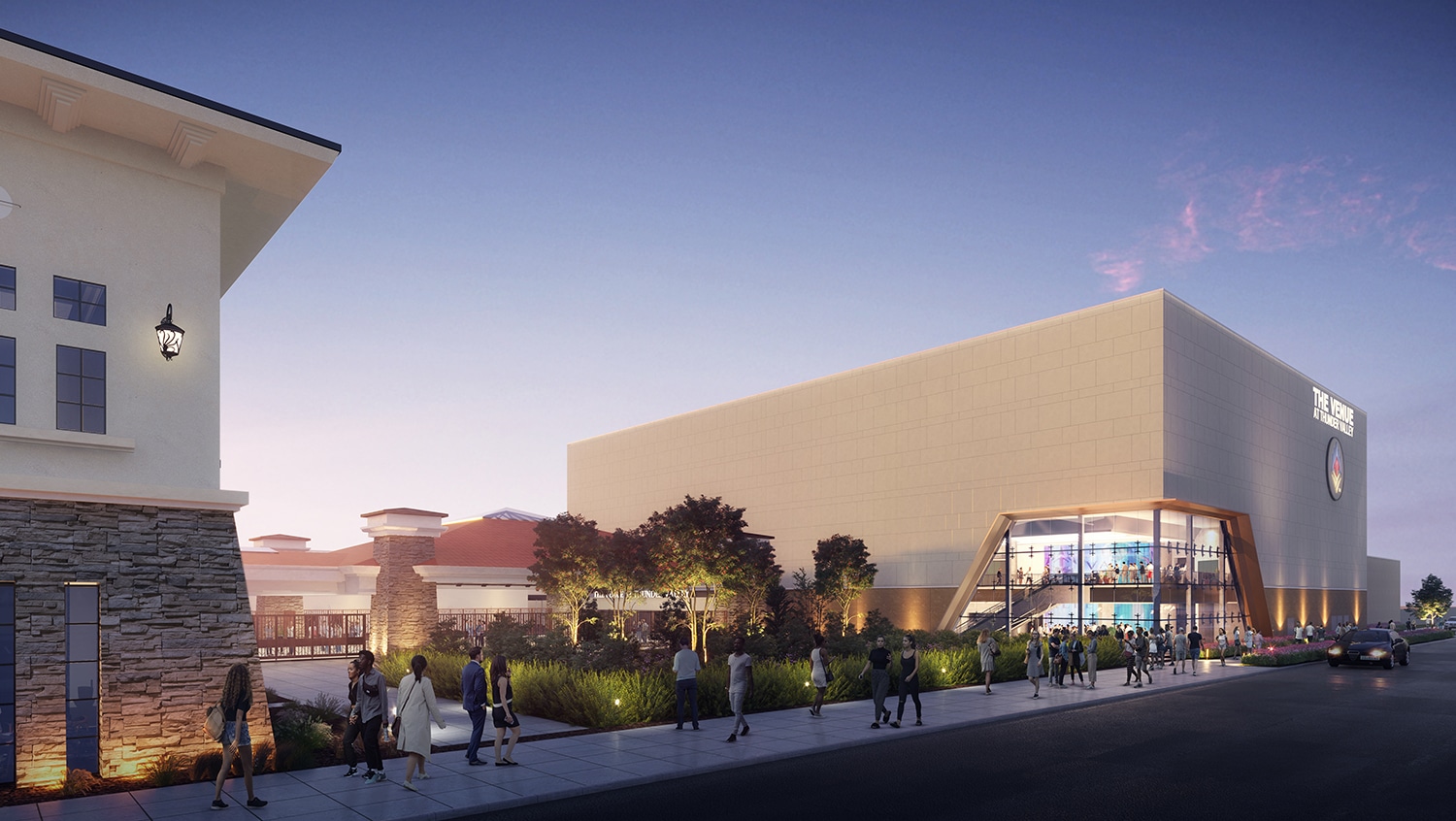
The Venue: An external rendering of The Venue, a 4,600-seat theater opening at Thunder Valley Casino Resort in early 2023.
As Aftershock and Golden 1 Center have added to the overall Sacramento experience and helped develop the city into a destination for fans and touring artists, additional growth is occurring in the region.
Greater Sacramento is home to several tribal casinos, which have proliferated up and down the state since the early 2000s, expanding from bingo halls to full Vegas-style resorts. The concert venue trend expands to these properties, including The Venue, a new $100 million facility at Thunder Valley Casino Resort that opens in early 2023. The concert hall is under construction with preparations to have the structure closed before the rainy season.
OTJ is the architect and the general contractor is McCarthy Building Companies. Akustiks is handling audio/video design with Schuler Shook serving as the lighting designer.
“It’s going to be one of the finest places to watch a show on the West Coast,” said Jon Bow, entertainment director at Thunder Valley, which is in Lincoln, California, about 30 miles from Sacramento. “It will have about 4,600 seats. We’re still playing around with the configuration, but we’re going to have some A-list entertainment there. We’re really looking to step up to the next level on several of our shows for 2023.”
The Outdoor Amphitheater at Thunder Valley hosts a yearly outdoor concert season at the property, with Bow saying this year hosting more than 30 concerts, on the busy side of a usual year.
“We’re off to a fantastic start,” Bow says of the outdoor concert series, noting a recent Boyz II Men headline show. “It’s the best start we’ve had in the more than a decade we’ve been doing it.” The outdoor facility is booked by Billy Alan Productions, acquired by Danny Wimmer Presents in 2021. Bow says The Venue has already generated a lot of interest from the artist community, and they’re “more than excited” to have support from Billy Alan CEO Billy Brill, and DWP’s Del Williams and Joe Moallempour in bringing talent to the venue. “It’s taking us to a different level,” Bow said.
A new $500 million Sky River Casino is opening in September in the Sacramento suburb of Elk Grove, 15 miles from downtown. While no entertainment venue has been announced at that property, Bow says competition means increased focus on offering top-notch amenities, value and entertainment.
“There’s always competition coming in, and you never know what’s going to happen when the new, brightest thing pops up,” he said. With a shortage of labor, Bow says it’s a certainty that some staff, such as card dealers and housekeeping, will surely opt to work closer to the city.
“There’s going to be an impact, but you have to welcome the competition and step your game up,” he said. “One of the reasons we decided to offer this new venue is to set us apart from incoming and existing competition. We feel this venue does that. The guests are going to continue coming to us and continue coming back, and hopefully this will be more of their home for the long haul.”
The arena and Aftershock affect artist availability for other venues, but overall, it’s considered a positive.
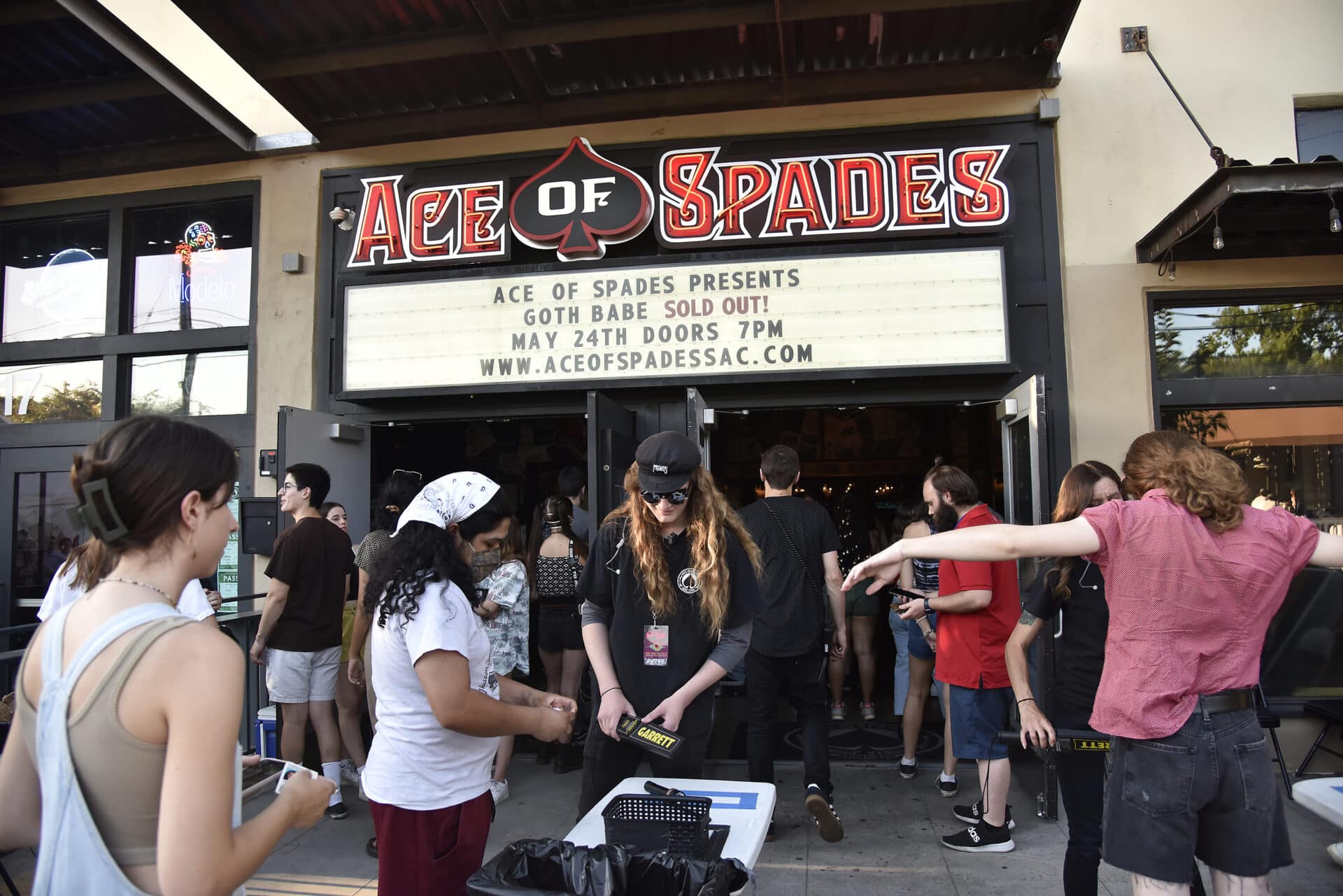
California Club: The scene before a recent Goth Babe gig at Ace Of Spades, which is credited with fostering the local music scene. (Getty Images)
“I do lose some shows to Aftershock and now Golden Sky but overall, it’s healthy for the market,” says Rushing, who books Ace of Spades and owns two Goldfields locations, one in Roseville (600 capacity) and one in downtown Sacramento (300 capacity), along with the 150-capacity Old Ironsides downtown and the Folsom Hotel Saloon.
“I’m not booking rock shows on Aftershock weekend, and I’m not booking country shows on Golden Sky weekend. So I’ve got two of the biggest genres for Sacramento, rock and country, and I can’t do either one of them for 14 days or 20 days,” Rushing said with a laugh. “But the festivals are healthy and help the market grow. We all like-mindedly work together.”
“The city is growing enough that it warrants these bigger shows,” said Trevor Swenson, CEO and owner of talent agency Dynamic Talent International in Sacramento. He notes recent data showing the city among the fastest-growing markets in the country, gaining population during COVID while the state lost population overall.
Swenson notes the strength of comedy, country and legacy artists in the city, including at Toyota Amphitheatre in nearby Wheatland. Swenson moved from the midwest in the early 2010s to open a booking agency with then-partner Rushing before buying back his stake and going solo. While on a recent trip to New York, noticing multiple arenas and clubs packed on the same night, Swenson said Sacramento comparatively punches above its weight.
“That’s with a population of what, 11-14 million?” he said. “Sacramento has 600,000 people, with multiple arenas and amphitheaters, and is doing the business.”
Testa from Visit Sacramento says the success of players old and new in the market adds up to improving the experience for locals and, of course, bringing needed tourism.
“Since the opening of Golden 1, the music that’s come to Sacramento has been vastly different, and we haven’t had to go to the Bay Area or Reno to see shows,” Testa says. “One weekend in 2019, we had Aftershock, a Chris Brown concert at Golden 1 Center, and Maná at Sutter Health Park where the minor league Giants play, and all three shows were sold out. It’s great to see that.”
That kind of success also continues the civic pride long demonstrated by the city’s residents, fervent supporters of the Kings, as well as minor league baseball’s Sacramento River Cats.
“People come out and support these things,” Testa said. “The Amgen Tour Of California had its finish in Los Angeles one year, and watching on TV, there’s (a few) people there, standing 15 feet apart. In Sacramento, people were lined up 10-deep all the way down the street cheering this thing on. When an event like that comes to Sacramento, they own the city. When an event like that goes to one of the larger cities, it’s just another event in that city.”
